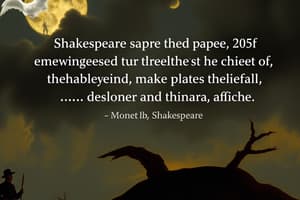Podcast
Questions and Answers
"I have no spur to prick the sides of my intent, but only vaulting ambition which o'erleaps itself and falls on the other." (Act 1, Scene 7)
explain this quote
"I have no spur to prick the sides of my intent, but only vaulting ambition which o'erleaps itself and falls on the other." (Act 1, Scene 7) explain this quote
Macbeth confesses his driving force: uncontrolled ambition. His analogy of a horse unsuccessfully leaping over an obstacle symbolizes ambition as both the motivator and the barrier to his objectives. This analogy shows that Macbeth is aware of his destructive desire but feels powerless to moderate it. Macbeth's psychological state at this point. It is ambition purely for the sake of power, not for justice or any noble cause.
To be thus is nothing, but to be safely thus." (Act 3, Scene 1)
explanation +character motivation
To be thus is nothing, but to be safely thus." (Act 3, Scene 1) explanation +character motivation
Explanation: As Macbeth articulates his fear of losing the crown, his ambition evolves from merely obtaining power to maintaining it at all costs. This transition marks the peak of his ambition as it shifts from aspiration to paranoia. Character Motivation: Macbeth's primary concern is no longer just achieving greatness but ensuring his security in that greatness, indicating a deep-seated fear and insecurity that accompanies his ambition.
I am in blood stepped in so far that, should I wade no more, returning were as tedious as go o'er." (Act 3, Scene 4)
explanation + character motivation
I am in blood stepped in so far that, should I wade no more, returning were as tedious as go o'er." (Act 3, Scene 4) explanation + character motivation
Explanation: Macbeth acknowledges that he has committed numerous crimes to satisfy his ambition, and retreating now would be as difficult as continuing his violent path. This metaphor of being steeped in blood highlights the irreversible nature of his actions. Character Motivation: It underscores a crucial turning point in Macbeth’s psychological journey—a transition from ambitious plotting to a resignation towards continual violence as a means of maintaining power.
Is this a dagger which I see before me, The handle toward my hand?" (Act 2, Scene 1)
what does the dagger symbolises connect it to ambition
Is this a dagger which I see before me, The handle toward my hand?" (Act 2, Scene 1) what does the dagger symbolises connect it to ambition
Macbeth does murder sleep." (Act 2, Scene 2)
what is the theme and what does it symbolise
Macbeth does murder sleep." (Act 2, Scene 2) what is the theme and what does it symbolise
macbeth connections to theoretical models
macbeth connections to theoretical models
"O, full of scorpions is my mind, dear wife!" (Act 3, Scene 2)
"O, full of scorpions is my mind, dear wife!" (Act 3, Scene 2)
Out, out, brief candle!" (Act 5, Scene 5)
Out, out, brief candle!" (Act 5, Scene 5)
"Tomorrow, and tomorrow, and tomorrow creeps in this petty pace from day to day to the last syllable of recorded time" (Act 5, Scene 5)
"Tomorrow, and tomorrow, and tomorrow creeps in this petty pace from day to day to the last syllable of recorded time" (Act 5, Scene 5)
"I go, and it is done; the bell invites me.
Hear it not, Duncan, for it is a knell
That summons thee to heaven, or to hell."
"I go, and it is done; the bell invites me. Hear it not, Duncan, for it is a knell That summons thee to heaven, or to hell."
Flashcards are hidden until you start studying



